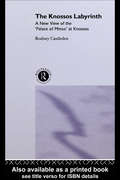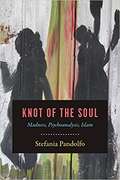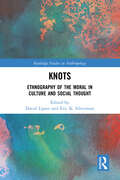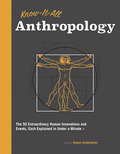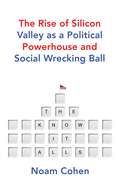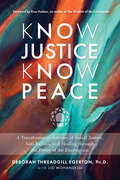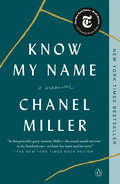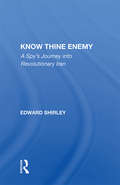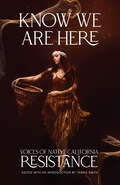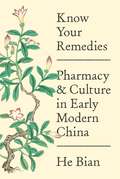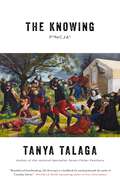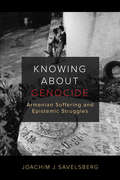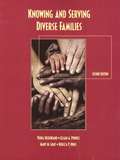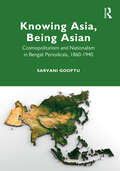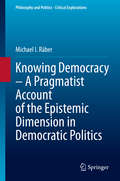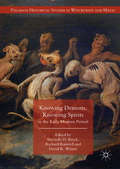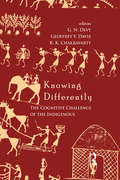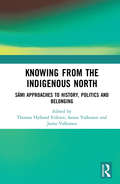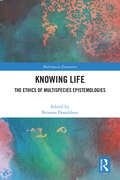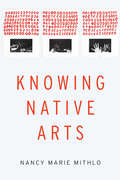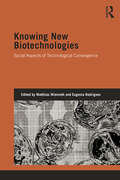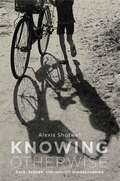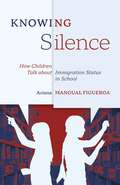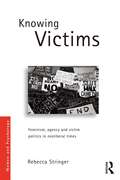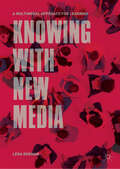- Table View
- List View
The Knossos Labyrinth: A New View of the `Palace of Minos' at Knossos
by Rodney CastledenKnossos, like the Acropolis or Stonehenge, is a symbol for an entire culture. The Knossos Labyrinth was first built in the reign of a Middle Kingdom Egyptian pharaoh, and was from the start the focus of a glittering and exotic culture. Homer left elusive clues about the Knossian court and when the lost site of Knossos gradually re-emerged from obscurity in the nineteenth century, the first excavators - Minos Kalokairinos, Heinrich Schliemann, and Arthur Evans - were predisposed to see the site through the eyes of the classical authors. Rodney Castleden argues that this line of thought was a false trail and gives an alternative insight into the labyrinth which is every bit as exciting as the traditional explanations, and one which he believes is much closer to the truth. Rejecting Evans' view of Knossos as a bronze age royal palace, Castleden puts forward alternative interpretations - that the building was a necropolis or a temple - and argues that the temple interpretation is the most satisfactory in the light of modern archaeological knowledge about Minoan Crete.
Knot of the Soul: Madness, Psychoanalysis, Islam
by Stefania PandolfoThrough a dual engagement with the unconscious in psychoanalysis and Islamic theological-medical reasoning, Stefania Pandolfo’s unsettling and innovative book reflects on the maladies of the soul at a time of tremendous global upheaval. Drawing on in-depth historical research and testimonies of contemporary patients and therapists in Morocco, Knot of the Soul offers both an ethnographic journey through madness and contemporary formations of despair and a philosophical and theological exploration of the vicissitudes of the soul. Knot of the Soul moves from the experience of psychosis in psychiatric hospitals, to the visionary torments of the soul in poor urban neighborhoods, to the melancholy and religious imaginary of undocumented migration, culminating in the liturgical stage of the Qur’anic cure. Demonstrating how contemporary Islamic cures for madness address some of the core preoccupations of the psychoanalytic approach, she reveals how a religious and ethical relation to the “ordeal” of madness might actually allow for spiritual transformation. This sophisticated and evocative work illuminates new dimensions of psychoanalysis and the ethical imagination while also sensitively examining the collective psychic strife that so many communities endure today.
Knots: Ethnography of the Moral in Culture and Social Thought (Routledge Studies in Anthropology)
by David Lipset Eric K. SilvermanKnots are well known as symbols of moral relationships. This book develops an exciting new view of this otherwise taken-for-granted image and considers their metaphoric value in and for moral order. In chapters that focus on Japan, China, Europe, South America and in several Pacific Island societies, granular ethnography depicts how knots are deployed to express unity in daily and ritual embodiment, political authority and the cosmos, as well as in social thought. The volume will be of interest to anthropologists and other scholars concerned with metaphor and symbolism, material culture and technology.
Know-It-All Anthropology: The 50 Extraordinary Human Innovations and Events, Each Explained in Under a Minute (Know It All Ser. #9)
by Simon UnderdownAn informative reference containing concise explanations for the major anthropological discoveries in human physical, cultural, and social history.Who are we? What is it about our species that sets us apart from every other living creature, past and present, on this planet?These are perennially compelling questions about human evolution and development that continue to cudgel the best brains on earth. Know-It-All Anthropology seeks to understand the roots of our common humanity, the diversity of cultures and world-views, and the organization of social relations and practices.If you only have under a minute, that is enough time—by reading this book—to meet the ancestors and master the basic ideas, personalities, controversies, and future directions of the study of humankind.The Know It All takes a revolutionary approach to learning about the subjects you really feel you should understand but have never gotten around to studying. Each book selects a popular topic and dissects it into the fifty most significant ideas at its heart. Each idea, no matter how complex, is explained in three hundred words and one picture, all digestible in under a minute.Other titles in this series include: Know It All Chemistry, Know It All Classical Music, Know It All Energy, Know It All Fashion, Know It All Great Inventions, Know It All Jazz, Know It All Medicine, Know It All Shakespeare, Know It All Whiskey, Know It All Wine, Space In 30 Seconds, Sports in 30 Seconds.
The Know-It-Alls: The Rise of Silicon Valley as a Political Powerhouse and Social Wrecking Ball
by Noam CohenThe world&’s tech giants are at the centre of controversies over fake news, free speech and hate speech on platforms where influence is bought and sold. Yet, at the outset, almost everyone thought the internet would be a positive, democratic force, a space where knowledge could be freely shared to enable everyone to make better-informed decisions. How did it all go so wrong? Noam Cohen reports on the tech libertarians of Silicon Valley, from the self-proclaimed geniuses Jeff Bezos, Peter Thiel, Reid Hoffman and Mark Zuckerberg to the early pioneers at Stanford University, who have not only made the internet what it is today but reshaped society in the process. It is the story of how the greed, bias and prejudice of one neighbourhood is fracturing the Western world.
Know Justice Know Peace: A Transformative Journey of Social Justice, Anti-Racism, and Healing through the Power of the Enneagram
by Deborah Threadgill EgertonA first-of-its-kind guide to social justice through the lens of the Enneagram--a popular personality typing system--that shows how people can use their particular type to work on issues such as antiracism and homophobia.Know Justice Know Peace is a unique guide told through the lens of the Enneagram that provides readers with a pathway to activating their authentic self so that they may participate in the healing all of humanity. Dr. Egerton will help the reader discover the indisputable fact of how deeply and intricately we are all connected.The reader is invited to explore their own personality archetype and to activate themselves as allies within a beloved community; a community that acknowledges that, while we come in many shades and colors, we are part of one human race. This book will serve all Enneagram practitioners regardless of race, religion, gender, or any "othering" category.Readers will explore: the cultural challenges of the social construct of race and the intersection of inner work through the nine different lenses of the Enneagram.their own meaning of "other" and allow it to surface in their consciousness, perhaps for the first timethe full concept of "other" and their early experience with differencestheir individual journey and the possibility of healing their own wounds and finding positive outcomes to help heal the worldKnow Justice Know Peace brilliantly illuminates how the inner work of each of the 9 Enneagram archetypes creates healing, elevates the consciousness, and aligns us as individuals with the heart of humanity in order to eliminate systemic racism. It provides the reader with a guide to activating their authentic self so that they may participate in the healing all of humanity.
Know My Name: A Memoir
by Chanel Miller<P><P>The riveting, powerful memoir of the woman whose statement to Brock Turner gave voice to millions of survivors <P><P>She was known to the world as Emily Doe when she stunned millions with a letter. Brock Turner had been sentenced to just six months in county jail after he was found sexually assaulting her on Stanford's campus. <P><P>Her victim impact statement was posted on BuzzFeed, where it instantly went viral--viewed by eleven million people within four days, it was translated globally and read on the floor of Congress; it inspired changes in California law and the recall of the judge in the case. Thousands wrote to say that she had given them the courage to share their own experiences of assault for the first time. <P><P>Now she reclaims her identity to tell her story of trauma, transcendence, and the power of words. It was the perfect case, in many ways--there were eyewitnesses, Turner ran away, physical evidence was immediately secured. But her struggles with isolation and shame during the aftermath and the trial reveal the oppression victims face in even the best-case scenarios. <P><P>Her story illuminates a culture biased to protect perpetrators, indicts a criminal justice system designed to fail the most vulnerable, and, ultimately, shines with the courage required to move through suffering and live a full and beautiful life. <P><P>Know My Name will forever transform the way we think about sexual assault, challenging our beliefs about what is acceptable and speaking truth to the tumultuous reality of healing. It also introduces readers to an extraordinary writer, one whose words have already changed our world. Entwining pain, resilience, and humor, this memoir will stand as a modern classic. <P><P><b>A New York Times Bestseller</b>
Know Thine Enemy: A Spy's Journey Into Revolutionary Iran
by Edward ShirleyThis book gives an account of Shirley's trip into Iran as a spy to provide an insight into Iranian character. It is a vivid, firsthand portrait of the clash of Western and Muslim civilizations. The book portrays Iranians in a way different from what the most Americans know about them.
Know We Are Here: Voices of Native California Resistance
by Terria SmithAn essential look at the ways California’s Native nations are resisting colonialism today, from education reform to protests against environmental injustice and beyond.Collecting over twenty-five essays written by more than twenty California Indian authors, Know We Are Here surveys many of the ways California’s Indigenous communities are resisting the legacies of genocide. Focusing on the particular histories, challenges, and dynamics of life in Native California—which are often very different from elsewhere in the United States—the book collects essays from writers across the state. It encompasses the perspectives of both elders and the rising generation, and the contributors include activists, academics, students, memoirists, and tribal leaders. The collection examines histories of resistance to colonialism in California, the reclaiming of cultures and languages, the connection of place and nature to wellness in tribal communities, efforts to overhaul the racist presentation of California Indians in classrooms and popular culture, and the meanings of solidarity in Native California. Unifying the book is an introduction by Terria Smith (Torres Martinez Desert Cahuilla Indians), editor of the renowned and long-running magazine News from Native California. This book is an indispensable resource for California Indian readers, educators of all levels in California, and students in Native studies courses nationally.
Know Your Remedies: Pharmacy and Culture in Early Modern China
by He BianA cultural history of the concept of pharmacy, both the material nature of drugs and the trade in medicine, in early modern China Know Your Remedies presents a panoramic inquiry into China’s early modern cultural transformation through the lens of pharmacy. In the history of science and civilization in China, pharmacy—as a commercial enterprise and as a branch of classical medicine—resists easy characterization. While China’s long tradition of documenting the natural world through state-commissioned pharmacopeias, known as bencao, dwindled after the sixteenth century, the ubiquitous presence of Chinese pharmacy shops around the world today testifies to the vitality of Traditional Chinese Medicine. Rejecting narratives of intellectual stagnation or an unchanging folk culture, He Bian argues that pharmacy’s history in early modern China can best be understood as a dynamic interplay between elite and popular culture.Beginning with decentralizing trends in book culture and fiscal policy in the sixteenth century, Bian reveals pharmacy’s central role in late Ming public discourse. Fueled by factional politics in the early 1600s, amateur investigation into pharmacology reached peak popularity among the literati on the eve of the Qing conquest in the mid-seventeenth century. The eighteenth century witnessed a systematic reclassification of knowledge, as the Qing court turned away from pharmacopeia in favor of a demedicalized natural history. Throughout this time, growth in long-distance trade enabled the rise of urban pharmacy shops, generating new knowledge about the natural world.Bringing together a wealth of primary sources, Know Your Remedies makes an essential contribution to the study of Chinese history and the history of medicine.
The Knowing
by Tanya TalagaFrom Tanya Talaga, the critically acclaimed and award-winning author of Seven Fallen Feathers, comes a riveting exploration of her family’s story and a retelling of the history of the country we now call Canada For generations, Indigenous People have known that their family members disappeared, many of them after being sent to residential schools, “Indian hospitals” and asylums through a coordinated system designed to destroy who the First Nations, Métis and Inuit people are. This is one of Canada’s greatest open secrets, an unhealed wound that until recently lay hidden by shame and abandonment. The Knowing is the unfolding of Canadian history unlike anything we have ever read before. Award-winning and bestselling Anishinaabe author Tanya Talaga retells the history of this country as only she can—through an Indigenous lens, beginning with the life of her great-great grandmother Annie Carpenter and her family as they experienced decades of government- and Church-sanctioned enfranchisement and genocide. Deeply personal and meticulously researched, The Knowing is a seminal unravelling of the centuries-long oppression of Indigenous People that continues to reverberate in these communities today.
Knowing about Genocide: Armenian Suffering and Epistemic Struggles
by Joachim J. SavelsbergA free open access ebook is available upon publication. Learn more at www.luminosoa.org. This book is freely available in an open access edition thanks to TOME (Toward an Open Monograph Ecosystem)—a collaboration of the Association of American Universities, the Association of University Presses, and the Association of Research Libraries—and the generous support of the University of Minnesota. Learn more at the TOME website, available at openmonographs.org. How do victims and perpetrators generate conflicting knowledge about genocide? Using a sociology of knowledge approach, Savelsberg answers this question for the Armenian genocide committed in the context of the First World War. Focusing on Armenians and Turks, he examines strategies of silencing, denial, and acknowledgment in everyday interaction, public rituals, law, and politics. Drawing on interviews, ethnographic accounts, documents, and eyewitness testimony, Savelsberg illuminates the social processes that drive dueling versions of history. He reveals counterproductive consequences of denial in an age of human rights hegemony, with implications for populist disinformation campaigns against overwhelming evidence.
Knowing and Serving Diverse Families (2nd edition)
by Lillian A. Phenice Mary M. Gray Rebecca P. Hines Verna HildebrandThis book aims to prepare students to work comfortably with all people and to help solve critical societal problems of relating to people at home, in the community, the nation, and the world.
Knowing Asia, Being Asian: Cosmopolitanism and Nationalism in Bengali Periodicals, 1860–1940
by Sarvani GooptuThis book studies the various representations of Asia in Bengali literary periodicals between the 1860s and 1940s. It looks at how these periodicals tried to analyse the political situation in Asia in the context of world politics and how Indian nationalistic ideas and associations impacted their vision. The volume highlights the influences of cosmopolitanism, universalism and nationalism which contributed towards a common vision of a united and powerful Asia and how these ideas were put into practice. It analyses travel accounts by men and women and examines how women became the focus of the didactic efforts of all writers for a horizontal dissemination of Asian consciousness. The author also provides a discussion on Asian art and culture, past and present connections between Asian countries and the resurgence of 19th-century Buddhism in the consciousness of the Bengalis. Rich in archival material, Knowing Asia, Being Asian will be useful for scholars and researchers of history, Asian studies, modern India, cultural studies, media studies, journalism, publishing, post-colonial studies, travel writings, women and gender studies, political studies and social anthropology.
Knowing Democracy – A Pragmatist Account of the Epistemic Dimension in Democratic Politics (Philosophy and Politics - Critical Explorations #14)
by Michael I. RäberHow can we justify democracy’s trust in the political judgments of ordinary people? In Knowing Democracy, Michael Räber situates this question between two dominant alternative paradigms of thinking about the reflective qualities of democratic life: on the one hand, recent epistemic theories of democracy, which are based on the assumption that political participation promotes truth, and, on the other hand, theories of political judgment that are indebted to Hannah Arendt’s aesthetic conception of political judgment. By foregrounding the concept of political judgment in democracies, the book shows that a democratic theory of political judgments based on John Dewey’s pragmatism can navigate the shortcomings of both these paradigms. While epistemic theories are overly and narrowly rationalistic and Arendtian theories are overly aesthetic, the neo-Deweyan conception of political judgment proposed in this book suggests a third path that combines the rationalist and the aesthetic elements of political conduct in a way that goes beyond a merely epistemic or a merely aesthetic conception of political judgment in democracy. The justification for democracy’s trust in ordinary people’s political judgments, Räber argues, resides in an egalitarian conception of democratic inquiry that blends the epistemic and the aesthetic aspects of the making of political judgments. By offering a rigorous scholarly analysis of the epistemic and aesthetic foundations of democracy from a pragmatist perspective, Knowing Democracy contributes to the current debates in political epistemology and aesthetics and politics, both of which ask about the appropriate reflective and experiential circumstances of democratic politics. The book brings together for the first time debates on epistemic democracy, aesthetic judgment and those on pragmatist social epistemology, and establishes an original pragmatist conception of epistemic democracy.
Knowing Demons, Knowing Spirits in the Early Modern Period (Palgrave Historical Studies in Witchcraft and Magic)
by Michelle D. Brock Richard Raiswell David R. WinterThis book explores the manifold ways of knowing—and knowing about— preternatural beings such as demons, angels, fairies, and other spirits that inhabited and were believed to act in early modern European worlds. Its contributors examine how people across the social spectrum assayed the various types of spiritual entities that they believed dwelled invisibly but meaningfully in the spaces just beyond (and occasionally within) the limits of human perception. Collectively, the volume demonstrates that an awareness and understanding of the nature and capabilities of spirits—whether benevolent or malevolent—was fundamental to the knowledge-making practices that characterize the years between ca. 1500 and 1750. This is, therefore, a book about how epistemological and experiential knowledge of spirits persisted and evolved in concert with the wider intellectual changes of the early modern period, such as the Protestant Reformation, the Scientific Revolution, and the Enlightenment.
Knowing Differently: The Challenge of the Indigenous
by G. N. Devy Geoffrey V. Davis K. K. ChakravartyThis book offers a bold and illuminating account of the worldviews nurtured and sustained by indigenous communities from across continents, through their distinctive understanding of concepts such as space, time, joy, pain, life, and death. It demonstrates how this different mode of ‘knowing’ has brought the indigenous into a cultural conflict with communities that claim to be modern and scientific. Bringing together scholars, artists and activists engaged in understanding and conserving local knowledge that continues to be in the shadow of cultural extinction, the book attempts to interpret repercussions on identity and cultural transformation and points to the tragic fate of knowing the world differently. The volume inaugurates a new thematic area in post-colonial studies and cultural anthropology by highlighting the perspectives of marginalized indigenous communities, often burdened with being viewed as ‘primitive’. It will be useful to scholars and students of anthropology, sociology, cultural studies, history, linguistics, literature, and tribal studies.
Knowing from the Indigenous North: Sámi Approaches to History, Politics and Belonging
by Thomas Hylland Eriksen Sanna Valkonen Jarno ValkonenFocusing on the Sápmi region of Northern Europe as a point of departure, this book enriches and sharpens the concept of 'the North.' It combines detailed empirical research on the Sámi people and their life-worlds with theoretical contributions from leading scholars. The authors consider the European North not only as a geographical site or an object of academic research, but as a particular way of knowing and being, with its own needs, practices, concepts, and imaginings. The North, as an epistemic position, offers its own conceptions of politics, human agency, history, and social relations, which this book studies and describes. The volume challenges us to consider social scientific knowledge, its significance, and the practices of producing it in a new way.
Knowing Life: The Ethics of Multispecies Epistemologies (Multispecies Encounters)
by Donaldson, Edited by BrianneKnowing Life examines the limits of dominant knowledge forms that contribute to current practices negatively affecting more-than-human beings, while also exploring alternative approaches to knowing that are capable of reducing harm and maximizing planetary thriving.Specifically, this volume seeks multispecies answers to long-standing questions in Western philosophy: Who or what counts as a knower? What kinds of knowing are valid? Is knowledge a product of mind, body, or something else? Historically, these epistemic questions have been answered in ways that neutralize the knowing and knowledge contribution of and for more-than-human beings, as well as those on the margins of society considered less than “human.” Consequently, these epistemic assumptions often support the destruction of ecological habitats, industrialization of food animals, widespread use of insect and plant toxins, water and air pollution, climate extinctions, ecological militarism, and the perpetual flow of living beings used for entertainment, research, clothing, companionship, and economic resources.In this book, crosscultural and multidisciplinary contributors—including lesser-known global religious-philosophical accounts, philosophies of plant and insect life, race and disability studies, laboratory epistemology, embodied semiotics, and scholar-artists—challenge and expand these classical concepts through diverse modes of embodied engagement on multispecies knowing toward open futures of planetary co-flourishing.
Knowing Native Arts
by Nancy Marie MithloKnowing Native Arts brings Nancy Marie Mithlo&’s Native insider perspective to understanding the significance of Indigenous arts in national and global milieus. These musings, written from the perspective of a senior academic and curator traversing a dynamic and at turns fraught era of Native self-determination, are a critical appraisal of a system that is often broken for Native peoples seeking equity in the arts. Mithlo addresses crucial issues, such as the professionalization of Native arts scholarship, disparities in philanthropy and training, ethnic fraud, and the receptive scope of Native arts in new global and digital realms. This contribution to the field of fine arts broadens the scope of discussions and offers insights that are often excluded from contemporary appraisals.
Knowing New Biotechnologies: Social Aspects of Technological Convergence (Genetics and Society)
by Matthias Wienroth Eugénia RodriguesThe areas of personal genomics and citizen science draw on – and bring together – different cultures of producing and managing knowledge and meaning. They also cross local and global boundaries, are subjects and objects of transformation and mobility of research practices, evaluation and multi-stakeholder groups. Thirdly, they draw on logics of ‘convergence’: new links between, and new kinds of, stakeholders, spaces, knowledge, practices, challenges and opportunities. This themed collection of essays from nationally and internationally leading scholars and commentators advances and widens current debates in Science and Technology Studies and in Science Policy concerning ‘converging technologies’ by complementing the customary focus on technical aspirations for convergence with the analysis of the practices and logics of scientific, social and cultural knowledge production that constitute contemporary technoscience. In case studies from across the globe, contributors discuss the ways in which science and social order are linked in areas such as direct-to consumer genetic testing and do-it-yourself biotechnologies. Organised into thematic sections, ‘Knowing New Biotechnologies’ explores: • ways of understanding the dynamics and logics of convergences in emergent biotechnologies • governance and regulatory issues around technoscientific convergences • democratic aspects of converging technologies – lay involvement in scientific research and the co-production of biotechnology and social and cultural knowledge.
Knowing Otherwise: Race, Gender, and Implicit Understanding (G - Reference, Information and Interdisciplinary Subjects)
by Alexis ShotwellPrejudice is often not a conscious attitude: because of ingrained habits in relating to the world, one may act in prejudiced ways toward others without explicitly understanding the meaning of one’s actions. Similarly, one may know how to do certain things, like ride a bicycle, without being able to articulate in words what that knowledge is. These are examples of what Alexis Shotwell discusses in Knowing Otherwise as phenomena of “implicit understanding.” Presenting a systematic analysis of this concept, she highlights how this kind of understanding may be used to ground positive political and social change, such as combating racism in its less overt and more deep-rooted forms. Shotwell begins by distinguishing four basic types of implicit understanding: nonpropositional, skill-based, or practical knowledge; embodied knowledge; potentially propositional knowledge; and affective knowledge. She then develops the notion of a racialized and gendered “common sense,” drawing on Gramsci and critical race theorists, and clarifies the idea of embodied knowledge by showing how it operates in the realm of aesthetics. She also examines the role that both negative affects, like shame, and positive affects, like sympathy, can play in moving us away from racism and toward political solidarity and social justice. Finally, Shotwell looks at the politicized experience of one’s body in feminist and transgender theories of liberation in order to elucidate the role of situated sensuous knowledge in bringing about social change and political transformation.
Knowing Silence: How Children Talk about Immigration Status in School
by Ariana Mangual FigueroaLearning from children about citizenship status and how it shapes their schooling There is a persistent assumption in the field of education that children are largely unaware of their immigration status and its implications. In Knowing Silence, Ariana Mangual Figueroa challenges this &“myth of ignorance.&” By listening carefully to both the speech and significant silences of six Latina students from mixed-immigration-status families, from elementary school into middle school and beyond, she reveals the complex ways young people understand and negotiate immigration status and its impact on their lives. Providing these children with iPod Touches to record their own conversations, Mangual Figueroa observes when and how they choose to talk about citizenship at home, at school, and in public spaces. Analyzing family conversations about school forms, in-class writing assignments, encounters with the police, and applications for college, she demonstrates that children grapple with the realities of citizenship from an early age. Educators who underestimate children&’s knowledge, Mangual Figueroa shows, can marginalize or misunderstand these students and their families. Combining significant empirical findings with reflections on the ethical questions surrounding research and responsibility, Mangual Figueroa models new ways scholars might collaborate with educators, children, and families. With rigorous and innovative ethnographic methodologies, Knowing Silence makes audible the experiences of immigrant-origin students in their own terms, ultimately offering teachers and researchers a crucial framework for understanding citizenship in the contemporary classroom.
Knowing Victims: Feminism, agency and victim politics in neoliberal times (Women and Psychology)
by Rebecca StringerKnowing Victims explores the theme of victimhood in contemporary feminism and politics. It focuses on popular and scholarly constructions of feminism as ‘victim feminism’ – an ideology of passive victimhood that denies women’s agency – and provides the first comprehensive analysis of the debate about this ideology which has unfolded among feminists since the 1980s. The book critically examines a movement away from the language of victimhood across a wide array of discourses, and the neoliberal replacement of the concept of structural oppression with the concept of personal responsibility. In derogating the notion of ‘victim,’ neoliberalism promotes a conception of victimization as subjective rather than social, a state of mind, rather than a worldly situation. Drawing upon Nietzsche, Lyotard, rape crisis feminism and feminist philosophy, Stringer situates feminist politicizations of rape, interpersonal violence, economic inequality and welfare reform as key sites of resistance to the victim-blaming logic of neoliberalism. She suggests that although recent feminist critiques of ‘victim feminism’ have critically diagnosed the anti-victim movement, they have not positively defended victim politics. Stringer argues that a conception of the victim as an agentic bearer of knowledge, and an understanding of resentment as a generative force for social change, provides a potent counter to the negative construction of victimhood characteristic of the neoliberal era. This accessible and insightful analysis of feminism, neoliberalism and the social construction of victimhood will be of great interest to researchers and students in the disciplines of gender and women’s studies, psychology, sociology, politics and philosophy.
Knowing with New Media: A Multimodal Approach for Learning
by Lena RedmanThis cutting edge book considers how advances in technologies and new media have transformed our perception of education, and focuses on the impact of the privatisation of digital tools as a mean of knowledge production. Arguing that education needs to adapt to the modern learner, the book’s unique approach is based on a disassociation with the deeply ingrained attitude with which people have traditionally viewed education – learning the existing symbolic systems of certain disciplines and then expressing themselves strictly within the operational modes of these systems. The ways of knowledge production – exploring, recording, representing, making meaning of and sharing human experiences – have been fundamentally transformed through the infusion of digital technologies into all aspects of human activity, allowing learners to engage with their immediate natural, social and cultural environments by capitalising on their individual abilities and interests. This book proposes a new approach to teaching and learning termed ‘cinematic bricolage’, which involves generating knowledge from heterogeneous resources in a ‘do-it-yourself’ manner while making meaning through multimodal representations. It shows how cinematic bricolage reconnects ways of knowing with ways of being, empowering the individual with a sense of personal identity and responsibility, helping to shape more aware social citizens.
